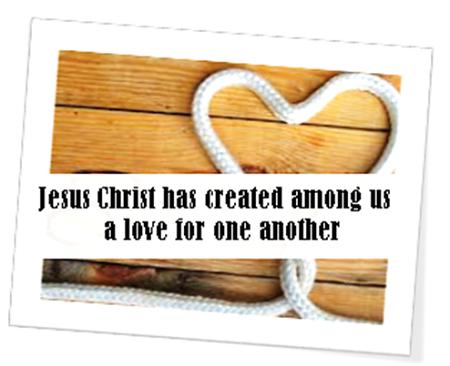Church Order: ''Love organized and spelled out''
Church Order: ''Love organized and spelled out''

It's been several months since Classis West of the United Reformed Churches discussed a host of overtures dealing with the recently adopted church order. Certain elements of the discussion leave me with a troubling thought: do we understand what it is to federate together as churches of Jesus Christ? Do we understand that federation is supposed to be an expression of the unity of the church of Jesus Christ, for which He prayed, for which His Father has worked, and still works in our lives, a Christian unity which it is our obligation to seek and pursue and nurture? Do we understand that it is a unity of love, which therefore makes demands of us, and calls us to the self-denial and self-sacrifice of love?
Sometimes it seems that our idea of church unity bears a frightening similarity to the world's idea of marital unity. Just as the world has exchanged the glory and the wonder of true marriage for an altered and impoverished substitute, maybe we have exchanged the glory and the wonder of true church unity for some sentimental and vague substitute.
At the risk of using an inappropriate analogy, I would say that the federative relationship does bear similarity to marriage, at least in some of its aspects. These aspects come to light especially when we discuss the requirements of the church order that local churches seek and receive the concurring advice of broader assemblies before proceeding with ecumenical relations, and before proceeding to the second step, and the final step of official discipline.
While deliberating on these issues, it became clear that many of the delegates saw the threat of hierarchialism in these requirements. They saw them as a yoke that would be placed, illegitimately, upon the shoulders of the local churches.
And, from a certain perspective, I will grant that they may appear to be those things. But I could say the same about the obligations of the marriage relationship.
Viewed from the outside, the obligations of marriage appear burdensome, and unreasonable. Imagine if you were to come to a young man or woman, and say to him or her, Here is a young woman for you; or, Here is a young man for you. You must marry this person, and remain married to him or her all of your life; you must live with this person until you die. Young lady, you must submit yourself to this man as the church submits to Christ. Young man, you must give yourself for this woman, as Christ loved the church, and gave Himself up for her.
Of course, there would be tremendous and vehement resistance to these requirements, laid on these two independent young people. And they could legitimately appeal to the fact that the Bible itself did not lay any such requirement on them.
And yet, look at what happens again and again in the church. We open the door of the sanctuary on a Saturday, and see a young man and a young woman. They have come of their own free will, before the preacher and the congregation, and they lay those heavy burdens of the marital bond upon themselves. With all their hearts, freely, without reservation, the young men promise to love, honour and cherish their brides, and the young women vow that they will love, honour and submit to their husbands, as long as their lives shall last.
Those who are unmarried and happy to stay that way say, Impossible! I wouldn't put myself in that position for a million dollars! And the world looks at these young people freely submitting themselves to the Biblical requirements of husbands and wives, and it says, Foolishness! Slavery! Bondage!
It is not that they haven't been warned. They have been warned: There are pitfalls and troubles ahead. There will be disagreements, and different ways of doing things. You have different histories, upbringings, personalities, needs, preferences, tastes, practices, emphases, diets, different approaches to money and family.

All these differences come into marriage. And if they don't threaten the unity of your marriage, they will threaten your identity as an individual. Dealing with these differences will either break the two of you apart, or, it will obliterate your existence as individual people. You will handle them at the cost of your marriage, or at the cost of your independence.
You will have to learn to make someone else happy; learn to compromise, to see the other side, to accommodate yourself, to try different ways, to have an open mind. Your single life is over. No more going out with whomever you want, whenever you want. No more consulting only with yourself about what you would like to eat, or what you would like to do.
But the young people make their vows with a smile. They can only see joy and happiness stretching out before them.
Why is that? Why do they see their vows and commitments so differently from the others? It is simple. They love one another. They believe that God brought them together. They have come to recognize in one another someone with whom they share so much — faith, hope, and love. They say to each other, You are God's gift to me. And they cannot conceive of life apart from one another.
Try as anyone might, they will not dissuade the young couple from their conviction that they need to be married. They are willing to take on every burden, voluntarily taking on the yoke of marriage, with its self-denial. And when the time comes, they will gladly receive the children the Lord gives them, without resentment at the cost.
They do it all because of love. They voluntarily take upon themselves a commitment that no tyrant or army could force upon them; they freely enter, with open eyes, a relationship that will, in a certain way, cost them their lives!
This is something of the true spirit of church unity, as it is expressed in the federation. I know that we cannot make a one-to-one comparison between marriage and church federation. God explicitly ordained marriage, but there is no particular text in the Bible that ordains church federation. All the same, the fact that it is love which forms the foundation of a Christian marriage, and which ought to be found in every relationship in which Christians are involved means that a comparison between marriage and church federation is legitimate.
And I am afraid that this diagnoses and exposes the reluctance to federate, and to live in the federation in true Christian unity and trust. I am afraid that this reveals the real reason why there is so much objection to seeking concurring advice in such matters as discipline and ecumenical relations.
We hear the description and the commitments expected; we hear the vows made by the "partners" as they covenant to a lifelong bond; we hear the "costs" that each must incur, the sacrifices, the burdens they take upon themselves. We hear the church order require us to seek and receive concurring advice of the classes or the synod, and we say, The Bible does not ask that of me anywhere. That compromises my independence, my freedom. That means that I have to give up some of my cherished habits and friends and practices, and I will not do that for you.
In other words, I do not love you. Self-denial is not in my ecclesiastical vocabulary. Trust for my brothers in ecclesiastical assemblies, instituted not out of explicit Biblical texts, but devised together as a means of working out and spelling out the love relationship among the churches, is not in my heart.
And we say, purportedly lending Biblical weight to our reluctance, Ephesus did not have to ask Corinth for concurring advice. Ephesus did not have to admit church visitors from Smyrna. Ephesus did not have to give quota offerings for the support of a seminary in Philippi, or to cover the costs of the meeting in Jerusalem.
Of course, Ephesus was not obliged to do any of these things. And of course, no church or assembly can lay such obligations on an independent congregation of the Lord Jesus. Of course, all of this is true. And so, if that is their aim, the biblicists have found their excuse to relieve their consciences of the obligations of love and church unity.

But the beauty of marriage, and of all Christian love for brothers and sisters is not that I have to do this, and I have to do that. The beauty of every Christian relationship is the beauty that Christ brings to it, through His Word and Spirit — the beauty of love, which expresses itself in trust, and in free self-denial and self-sacrifice. No, I don't have to do it — but I want to do it. No, no one else has laid this obligation on me, but I would be unhappy unless I did it. I lay it on myself.
That can be the beauty and the meaning of church federation. That can be the message that is proclaimed and displayed to the world: that Jesus Christ has created among us a love for one another that drives us together. That Jesus Christ enters this world of brokenness and enmity and distrust, and brings to it something of the new order of things. It may be impractical and unrealistic. But I believe it is what we must pray and work for.
It's what we ought to seek to have reflected in our church order. As one minister has said, The church order is simply love organized, and spelled out.

Add new comment